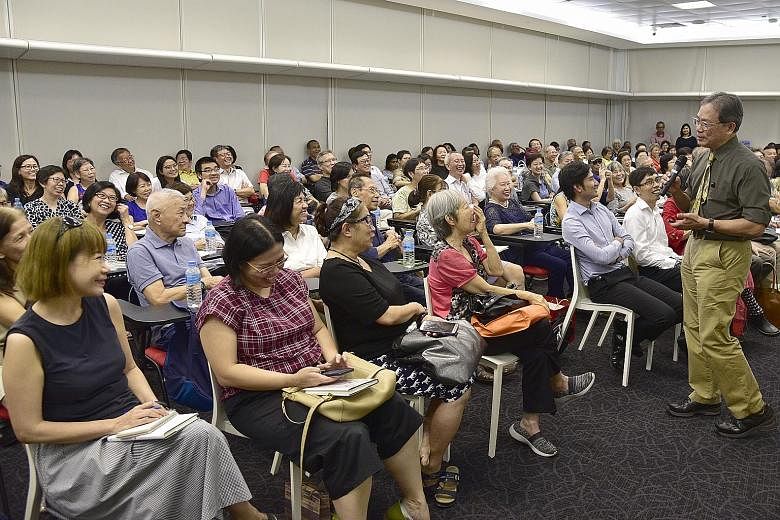Life has a way of coming full circle, as Professor Kua Ee Heok found in 2000.
On Oct 31 that year, 83 people died when Singapore Airlines flight SQ006 crashed on a closed runway at Taipei's international airport.
At first, Taiwan's government barred the flight's two pilots from flying back to Singapore. "They were kept in their hotel," he told close to 200 readers at The Big Read Meet last Wednesday.
The Meet, which this writer moderates monthly, is the non-fiction book club which The Straits Times has run with the National Library Board since 2013.
"Every time they came out of their rooms," Prof Kua added, "the families of the crash victims were there, cursing them. The pilots couldn't sleep at all."
At the request of SIA's top brass, Prof Kua, 68, flew to Taipei to treat the pilots. "That was the first time I ran a clinic at 9pm," he said.
He also convinced Taiwan's authorities to let them return to Singapore until they were "well enough to return to stand trial in Taiwan" - and who should sign their release papers, but a Taiwanese doctor who had once worked with him in Singapore.
He also told readers that after this writer's review of his new book, Colours Of Ageing, was published in June, a retired lawyer who read it donated $2 million for him to carry on his research into dementia.
That, he noted in a riveting 75-minute talk, was a sea change from when he pioneered studies on dementia and depression among the elderly here in the 1980s.
The alumnus of the universities of Oxford and Harvard decided to specialise in psychiatry in 1977, at a time when 95 per cent of Singaporeans aged 60 or older had depression, but only between 3 and 5 per cent of Singaporeans had dementia and Alzheimer's disease "was considered a white man's disease".
He recalled personally interviewing 612 elderly people in Chinatown and Toa Payoh, and learnt that those in Chinatown, though relatively poor, were less prone to depression because they gathered at the void deck to mingle daily.
Those in Toa Payoh, however, kept to themselves and ate better, and although they were middle-class, more among them were depressed because of "social isolation".
At first, he recalled, no one would give him any money to start a dementia prevention programme.
It got to the point where he wondered if he should go into private practice instead.
Then, about 25 years ago, he started The Memory Clinic, Asia's first - within Jurong Point shopping mall, in a space set aside by a generous donor.
"I wanted to know, as families of dementia patients would want to know, if I was diagnosed with dementia here today, how long would I have to live?" The global median was five years, but he and his researchers found that in Singapore, it was 12 years or more.
He and his researchers "knocked on every door of 50 blocks of flats in Jurong" looking for elderly folk who would come to Jurong Point and take part in their research. "All our consultations were free, otherwise they couldn't afford it," he recalled.
"We brought people at high risk of getting dementia to Jurong Point and told them what the diseases were, what kind of diet and exercise they should take to stay well and so on. We assessed them for memory decline. We also gave them music and art therapy."
The upshot was that within two years, a private donor gave him $1.8 million to speed up his research, which he had initially meant to do over 10 years.
Music and art therapy, he stressed, could reverse memory decline in at least 10 per cent of those who were likely to have dementia. "Every year in Singapore, 2,500 people are diagnosed with dementia. I told Minister of Health Gan Kim Yong that if we can prevent 10 per cent of these cases, there would be immense cost savings for their families."
Every month, he noted, each family of a dementia-afflicted person had to spend at least $300 on his care alone.
Retired teacher and Meet regular Beatrice Tay, 61, was intrigued to find out that China was keen to learn how Singapore treats dementia, as 12 million of China's citizens had it, with another 20 million at great risk of having it.
Prof Kua ended his talk with three tips for everyone to stave off dementia: First, keep learning new things; second, form a group of friends and meet them regularly; and, finally, write something about your life to leave to your family.
He said afterwards: "The Big Read Meet was a most splendid evening… I was enthralled by the opinions and questions of readers who were senior doctors, corporate leaders, teachers and retirees who came from as far north as the Malaysian towns of Sungai Petani, Batu Pahat and Johor Baru."


